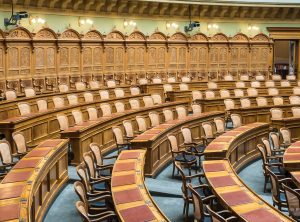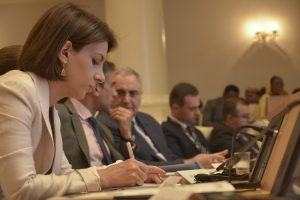Introducing OGP’s Way Forward on Parliamentary Engagement
Over the course of 2021, the OGP Support UnitThe OGP Support Unit is a small, permanent group of staff that work closely with the Steering Committee and the Independent Reporting Mechanism to advance the goals of the Open Government Partnership.... has conducted a review of its objectives, policy and practice on parliamentary engagement. The review was initiated by OGP Co-ChairsThe leadership of the Steering Committee is made up of four co-chairs who provide strategic guidance and support to advance OGP’s overarching priorities. Co-Chairs serve two-year terms beginning on ... Maria Baron and the Government of South Korea.
A strong evidence base, a global survey and consultations with over 100 people in the open government community, including parliamentarians, parliamentary staff, government officials, civil society actors and other OGP stakeholders confirmed that working with parliaments pays off. Since the launch of OGP, parliaments have passed open government reforms into law, have challenged governments on ambitionAccording to OGP’s Articles of Governance, OGP commitments should “stretch government practice beyond its current baseline with respect to key areas of open government.” Ambition captures the po... and implementation and have experimented with opening up their own house. The review also offered concrete suggestions on what we were hoping to learn: how to scale and accelerate that engagement to help advance open government reforms.
The new Memorandum on Parliamentary Engagement, approved by the OGP Steering CommitteeThe Steering Committee is OGP’s executive decision-making body. Its role is to develop, promote and safeguard OGP’s values, principles and interests; establish OGP’s core ideas, policies, and ru... in November 2021, aims to do just that. Building on OGP member practices, it recognizes that in the open government context, parliaments have a role to play in:
- Taking legislative action: Parliaments can champion open government values by introducing, reviewing and ratifying legislation relevant to open government or approving budgets for open government reform. Legislative action proved pivotal for the implementation of beneficial ownership commitments in Armenia and Nigeria; in Latvia, the steady engagement of senior members and staff of parliament helped build support for legislative reforms on transparencyAccording to OGP’s Articles of Governance, transparency occurs when “government-held information (including on activities and decisions) is open, comprehensive, timely, freely available to the pub... More and lobbyingLobbying transparency allows the public to ensure that there is diversity of participation and contribution to public decision-making. Technical specifications: Policies and actions affecting lobbying....
- Ensuring parliamentary oversight: Parliaments have a role in holding governments accountable for open government reforms and opening up their own oversight processes to public scrutiny. In Liberia, parliament will participate in monitoring the implementation of the OGP action planAction plans are at the core of a government’s participation in OGP. They are the product of a co-creation process in which government and civil society jointly develop commitments to open governmen..., while the Parliament of Georgia is said to be co-creating a legislative oversightEffective parliamentary oversight of the executive branch is key to the integrity of democratic systems and, by extension, to the open government agenda. Technical specifications: Commitments that inv... commitmentOGP commitments are promises for reform co-created by governments and civil society and submitted as part of an action plan. Commitments typically include a description of the problem, concrete action... with reference to the COVID-19 stimulus package. This is an area where much more needs to be done, with a considerable lag in commitments made on oversight compared to other areas of action.
- Opening up parliamentary processes: Parliament can adopt open government principles – transparency, accountability, participation and inclusion – in the parliamentary institution and processes. In Argentina, the House of Deputies and Senate undertook significant asset declaration reforms, resulting in new databases sharing previously undisclosed information. In recent years, several parliaments have also co-created and implemented their own open parliament plans, including Chile, Indonesia, and North Macedonia.
- Creating space for dialogue: Parliaments are uniquely suited to foster cross-party dialogue and support to advance and institutionalize open government reforms. In Ghana, representatives from Parliament participated in the co-creation of the fourth action plan to facilitate complimentary action on open government reforms. In the Netherlands, a resolution by the Parliament on political advertising created much-needed visibility for pressing open government concerns.
The Memorandum draws on these practices to offer three models of engagement to parliaments that would like to engage with OGP – national and local.
- The first and preferred model is participation by parliaments in the national or local OGP process. This model was validated during the consultations as the approach that best helps achieve synergies on open government across different branches of government. It also helps use time and resources for co-creation and consultation more efficiently and reduces transaction costs for civil society. This is the model most commonly used by parliaments in OGP to date; from formal to informal, with direct or indirect roles in commitment adoption or implementation and – where needed – with reference to the constitutional separation of powers. Given its considerable advantages, this is the model members are encouraged to pursue, and this is where the OGP Support Unit will focus its attention. Guidance for all interested OGP stakeholders will be published in early 2022.
- Additionally, OGP will continue to accommodate open parliamentEnsuring access to legislative information and creating mechanisms for public participation are critical to building an open, trusting relationship with citizens. Technical specifications: Commitments... More plans, co-created by parliament and civil society organizations. Under the new framework, parliaments will be able to determine the duration and timelines for stand-alone action plans in consultation with civil society, allowing better alignment with parliaments’ calendar and strategic objectives. They will have to develop a mechanism to report on their co-creation processCollaboration between government, civil society and other stakeholders (e.g., citizens, academics, private sector) is at the heart of the OGP process. Participating governments must ensure that a dive... and commitment implementation. Parliaments will be able to pursue this model of engagement once guidance on the co-creation, implementation and reporting mechanism of these plans is published in 2022.
- Last but not least, OGP recognizes that some parliaments may prefer to work outside of the OGP framework. Similarly, parliaments in non-OGP countries or local members may also wish to advance open parliament commitments or open government at large. As always, OGP welcomes this engagement. Peer exchange and learning will come into greater focus in 2022 as implementation of the revised approach to parliamentary engagement commences.
With this Memorandum, we endorse the ground-breaking work of countless OGP stakeholders and encourage others, where possible, to follow their lead. We look forward to working with all of you in strengthening parliamentary engagement at all levels.
No comments yet
Related Content

Memorandum on Parliamentary Engagement
This memorandum aims to provide a coherent framework for parliamentary engagement where it is pursued. Recognizing that different political systems...

Parliamentary Engagement in OGP: Learning from the Evidence
This paper aims to inform the Legislative Engagement Policy review and serves as background for consultations with parliaments and partners.

Parliaments as Partners for Open Government Reform
An analysis on where OGP has successfully partnered with parliaments to date and how such partnerships could be deepened to develop and implement more ambitious open government reforms


Leave a Reply